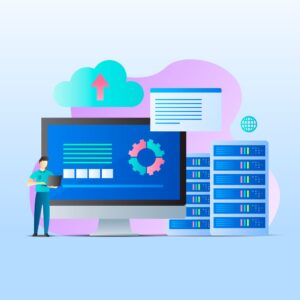A NetSuite ERP (Enterprise Resource Planning) system is a comprehensive cloud-based business management software that streamlines various aspects of your operations to enhance efficiency. While it offers powerful tools to manage every facet of your business, integrating NetSuite ERP with your existing systems can introduce complexities and challenges that need to be carefully navigated.
In fact, NetSuite reports that 51% of businesses encounter operational tribulations during ERP implementation, including issues with data migration, process alignment, and user adoption. Implementing an ERP system requires professional assistance and expertise – which is why partnering with the right specialist can be a game-changer for your business. They will identify the potential bottlenecks and implement top-tier solutions.
However, before diving into the implementation process, it’s essential to understand the common challenges your business may face and how to effectively address them. This blog post covers all the common business ERP implementation challenges and solutions you can leverage to address them with the help of an expert.
Keep reading to learn more!
Common Business Challenges During Implementation
Understanding the common challenges a business faces during implementation can help you opt for the right ERP system implementation capable of operating distinct tasks efficiently. Lets delve into these challenges and explore effective strategies for overcoming them.
#1. Data migration
As market trends and technology continue to advance, it becomes essential to leverage an agile platform or migrate your data to a top-tier ERP system to stay competitive.
But migrating data from your existing platform will undertake many challenges and unexpected hurdles, including inconsistent data format, data hygiene, integrity issues, and duplicate entries. And of course, this is not a walk in the park without meticulous planning and execution. One minute error even can jeopardize the entire success of your ERP implementation.
#2. Poor user adoption and training
Understanding the nuances, applications, and potential risks associated with each enterprise resource planning (ERP) system is vital for a successful implementation. Even a minor mistake can jeopardize the entire project. Therefore, to ensure a smooth and successful ERP implementation, it is essential to thoroughly educate your team on the system’s functionalities and best practices.
In general, user adoption and inadequate training are the common obstacles impeding successful ERP implementation in businesses. This usually occurs when users are unfamiliar with new features, processes, and usability, resulting in not fully utilizing the platform’s capabilities and reduced return on investment.
#3. System integration
An ERP system provides the entire company with access to consistent and reliable data, making integration a critical initial step. However, integrating data from various sources, applications, and software into an ERP system presents several challenges, including data synchronization, accounting discrepancies, inconsistent formats, and complex data mappings.
According to research, experts believe that up to 20% of ERP implementation challenges occur due to poor integration which may produce inaccurate data and make it challenging to update live inventory.
But with effective planning and a experienced ERP consultant, you can keep the ERP installation on track and within budget. Not only this, but you can ensure the platform can be your single source of truth for all data, minimizing the time spent integrating scattered data.
#4. Cost Incurred on Implementation
Investing in ERP implementation requires careful consideration of every expense. Its crucial to evaluate all related costs when setting up an enterprise resource planning (ERP) system. While the initial charges may seem straightforward, additional expensesparticularly those tied to custom solutionscan include numerous hidden fees.
Generally, the final cost of ERP implementation is significantly influenced by the level of customization required for smooth operations. Its important to assess both the customization demands and their associated costs to ensure that the configuration stays within your budget.
#5. Resistance to change
Overcoming employee resistance is the most significant challenge during NetSuite ERP implementation, especially for individuals who are familiar with manual procedures or outdated systems. This reluctance is frequently the result of unawareness of the new system’s features, doubts about its advantages, or worries about losing one’s employment.
Enterprise resource planning solutions provide many benefits, but change is often unpleasant. And if the team isn’t aware of the dynamic fundamental system, it may cause delays and opposition. However, before the new software goes live, invest a little time to thoroughly train your team on how the ERP system would make their everyday activities easier rather than harder.

Best Practices to Overcome These Challenges
Effectively addressing the challenges associated with ERP system implementation is key to unlocking the full potential of NetSuite, enabling your business to operate more efficiently. By implementing strategic best practices, you can not only mitigate these challenges but also turn them into opportunities for growth and optimization. Lets explore some of the most effective solutions:
#1. Thorough planning
Achieving success in todays competitive business environment requires more than just financial growthit demands a strategic approach to managing and optimizing your operations. One of the key elements of this strategy is the implementation of a robust ERP system. However, the success of this endeavor hinges on thorough planning and careful execution.
To achieve a seamless ERP implementation, you must begin by defining specific goals that the system should help you accomplish. These goals will guide every step of the implementation process, from the initial assessment to the final deployment. Next, conduct a comprehensive assessment of your existing processes and systems to identify gaps, inefficiencies, and areas for improvement. This assessment will serve as the foundation for designing an implementation plan that is both strategic and actionable. By taking the time to plan thoroughly, you position your business to maximize the benefits of your ERP system, ensuring a smoother transition and a greater return on investment.
#2. Stakeholder engagement
You need to involve key stakeholders throughout the entire process to manage multiple stakeholders during ERP implementation. Once you successfully include them at the initial stage, it will help you build buy-in and address any potential concerns they may have.
Effective communication and open dialogue with all stakeholders at every stage will ensure their goals and expectations are met. This strategy fosters a positive relationship and ensures that every stakeholder feels valued and involved in the process.
#3. Ongoing training
As highlighted earlier, poor user adoption and inadequate training are among the most common hurdles businesses face during ERP implementation. To overcome these challenges, its essential to equip your staff with the necessary skills and knowledge to effectively utilize the ERP system. Providing comprehensive training programs that help employees understand the systems features and functionalities can significantly improve user adoption and ensure a smoother implementation process.
Moreover, partnering with a reliable and robust NetSuite ERP provider can make a substantial difference. A trusted provider offers ongoing support and regular training sessions, fostering a culture of continuous learning within your organization. This commitment to education ensures that your employees remain proficient in using the ERP system and stay up-to-date with the latest best practices and innovative solutions. With the right support, your team can fully leverage the capabilities of NetSuite ERP, driving greater efficiency and success for your business.
#4. Continuous improvement
Regular monitoring and assessing your enterprise resource planning (ERP) system performance plays a crucial role in identifying potential bottlenecks. And by integrating analytical software into your ERP system, it would be easy for you to gain valuable insights into the system’s performance, and project progress to keep track of the status. These insights can be utilized to analyze progress, identify the gaps, and make necessary adjustments to optimize the system, ensuring that it continues to cater to your business’s evolving needs and objectives.
How Entartes Can Help You Navigating These Challenges
Entartes takes pride in providing premier NetSuite ERP implementation solutions across the entire U.S. With over a decade of experience in implementing ERP systems for businesses like yours, we leverage our extensive expertise and real-world case studies to address your unique challenges. Our commitment to offering top-tier ERP solutions with budget-friendly packages and timely delivery distinguishes us from the competition.
At Entartes, we dont just deliver ERP systemswe deliver results. Our approach is grounded in a deep understanding of the intricacies of ERP implementation, and we pride ourselves on our ability to combine cutting-edge technology with practical, real-world insights. By leveraging our wealth of experience and a library of real-world case studies, we ensure that your ERP implementation is both efficient and effective.
- Over 10 Years of Expertise: With more than a decade of exceptional experience, our team possesses the deep knowledge necessary to navigate even the most complex ERP challenges.
- Proven Success: Our track record speaks for itself. We have consistently delivered successful ERP implementations that drive tangible results for our clients.
- Agile Methodology: We utilize an agile approach to ensure flexibility and efficiency throughout the implementation process, adapting quickly to meet your evolving needs.
- Ongoing Support and Training: Our relationship doesnt end with implementation. We provide continuous customer support and training sessions to empower your team and keep them up-to-date with the latest best practices.
- Budget-Friendly Solutions: Understanding that every business has unique financial constraints, we offer customizable, budget-friendly plans tailored to meet your organizations specific needs without compromising on quality.
By choosing Entartes, youre not just opting for an ERP provideryoure partnering with a team thats dedicated to your long-term success. We work closely with you at every step to ensure that your ERP implementation is a seamless and rewarding experience, helping your business achieve its full potential.
Final words
As you know implementing NetSuite alone is not enough to overcome the challenges but can be a walk in the park when partnering with an expert partner like Entartes. They have a blend of skilled professionals, expertise, and real-world experience.
Choosing the right provider is crucial to ensuring that your NetSuite implementation meets your specific business needs and goals. By working with a reputable NetSuite solutions provider like Entartes, you can effectively tackle challenges, boost efficiency, streamline operations, and receive continuous support, guidance, and training. This partnership ultimately drives organizational success and facilitates a seamless transition to the new system.
Fuel your business growth with NetSuite Consulting.



